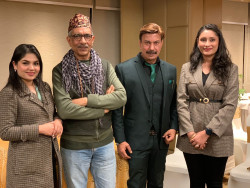Kollywood
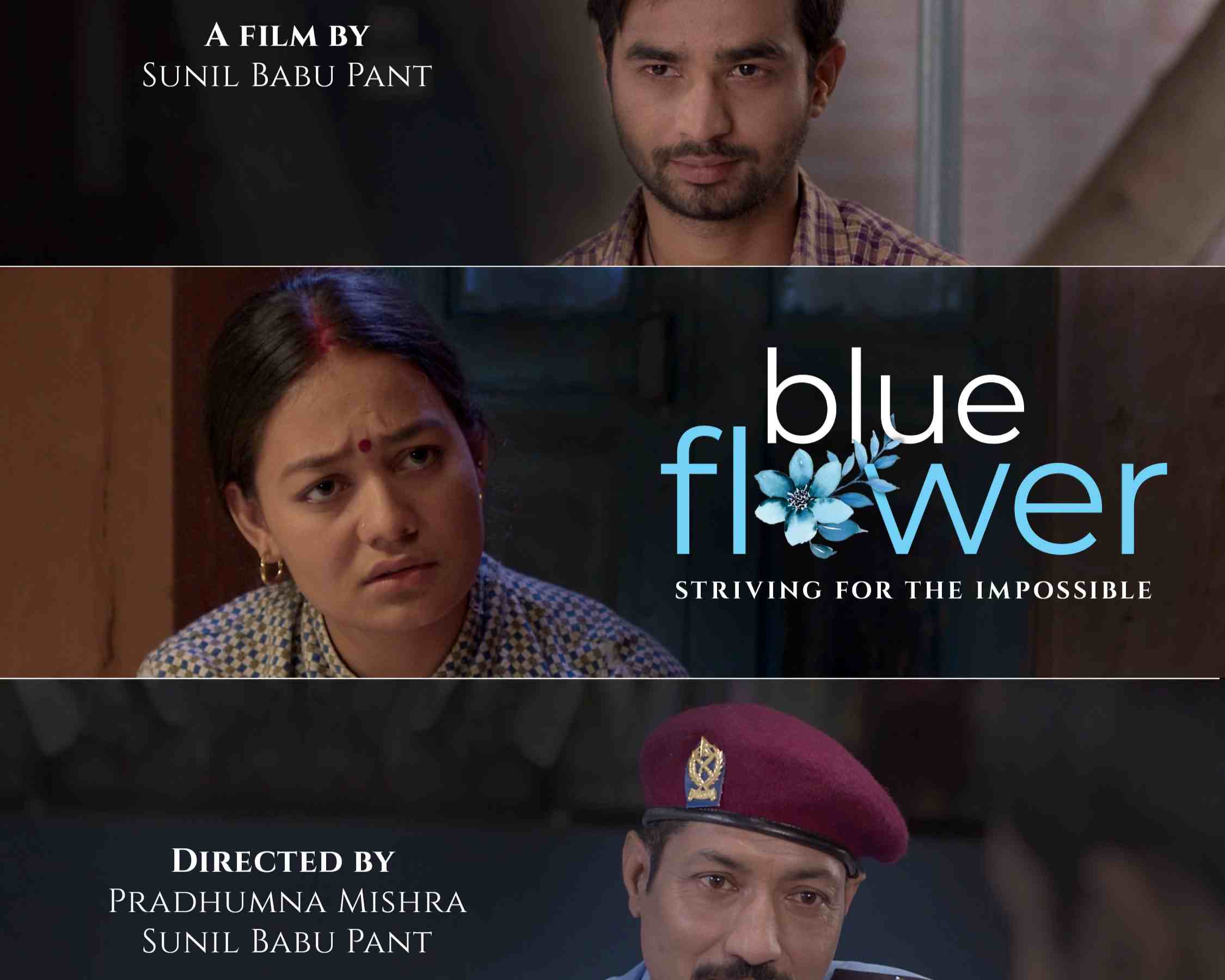
By Madhav Dulal, translated by Niranjan Kunwar
“You’re married now. Focus on becoming a father. You never listen, do you? You are a man! Don’t destroy our prestige!”
The short film, “Blue Flower”, which premiered in Kathmandu on February 8, depicts conversations prevalent in Nepali society.
The girl makes a request, “Why don’t you sleep up here?” The boy obliges but reluctantly.
The girl asks, “Did you get married against your wish?”
“I didn’t want to; please understand,” the boy replies.
“Who will understand me? Who knows what happens behind closed doors?” The girl continues to interrogate. “Are you impotent?”
The boy tells her he is not impotent; but confesses that he is sexually attracted to men only.
“Why didn’t you reveal this before the marriage?” the girl demands to know.
“I made a promise to my mother. You can leave. I won’t stop you.”
Faced with this reality - the boy with whom she’d exchanged marital vows --now, her husband -- turned out to be a boy forced to marry. The girl curses her fate: “My life is destroyed.” She cries herself to sleep.
Forced marriages

When someone identifying as asexual and gender minority is forced to marry against his wish, a girl is compelled to curse her fate. When she can’t get pregnant, the girl gets accused of being a witch. As it happens, Tilak, the protagonist of the short film “Blue Flower”, is determined to liberate his wife from what will surely be a hellish existence.
“I want to die in peace after witnessing my younger son’s child,” Tilak’s mother declares. Women from the village openly gossip about Tilak in front of his wife at the watering hole.
“They say he’s not even a real man; how will they have kids?”
“Maybe the issue lies with you.”
Amid this conversation, representatives of an organisation, Sabhya Samaj, approach the women. Suni Babu Pant, who appears in character as one of these representatives, says, “If someone’s human rights have been transgressed, or forced to marry, let us know. We also provide job training.”
Tilak’s wife relayed this information to her husband, reporting that they were homosexual men. “Turns out I’m not unlucky,” Tilak responds in gratitude. “I will never forget this.” After discussing with his wife, Tilak moves to the city, far from home, and gets in touch with Sabhya Samaj.
Sabhya Samaj is mandated to distribute condoms. But the police nab Tilak and his colleagues while they were in the field, accusing them of immoral activities. At the police station, the health workers ask, “Are we, prostitutes? Shouldn’t we be treated as humans?”
Ghanashyam Joshi, in the character of an inspector, instructs his subordinates to be careful before making arrests. Later, he confesses his affection for Tilak, who reminds him of a boy who was dear to him, “Have you heard of Pravesh KC? He looked like you. He used to love me. I wonder what happened to him.”
The inspector suggests that Tilak stay with him and help out with household chores.
Encouraged, Tilak also confesses that he is attracted to older men. Their relationship deepens and they become intimate. Tilak shares his wife’s story, persecuted because she couldn’t produce a child. When he requests his lover to impregnate his wife, the inspector hesitates but eventually agrees.
Tilak then approaches his wife to talk it out. “In that case, I don’t want any children. Don’t you feel awkward, trying to make me a whore?” she asks tearfully. “No one will point a finger at us if you give birth to a child,” Tilak convinces his wife.
The film’s primary message is transmitted through the character Tilak’s internal reflection: I couldn’t fight on my own but I also didn’t give up and kill myself. Instead, I chose a middle path.
Tilak’s wife questions her husband’s partner, “You have your own children. Why did you agree to this?”
“I also love Tilak. You can treat me the way you treat your husband.” The police inspector portrays a bisexual man.
Will she give birth to a child? Will the family be prosperous? The short film “Blue Flower” projects these questions to the audience and concludes without a clear resolution.
Pant’s Comeback
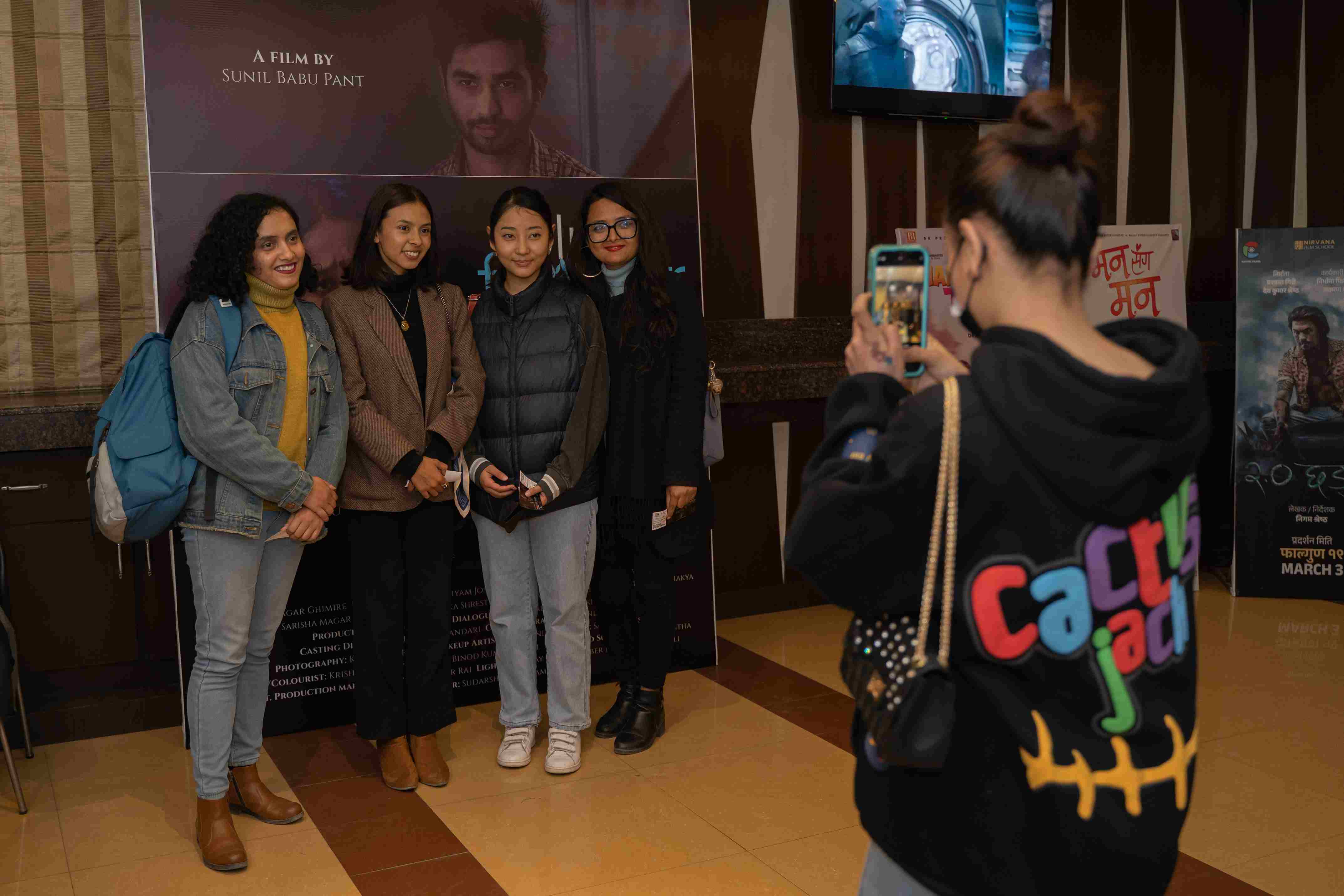
Sunil Babu Pant was born in Gorkha. “If I had remained in Gorkha, my situation might have reflected Tilak’s,” Pant spoke after the screening on Wednesday. In 2001, Pant founded the Blue Diamond Society, a non-governmental organisation, with the objective of supporting the human rights and health of sexual and gender minorities. He also filed a writ petition at the Supreme Court, advocating for the rights and identities of sexual and gender minorities. On December 21, 2007, the Court decided on the case filed by Pant (Sunil Babu Pant and Others v. Government of Nepal) who was also a member of the first Constituent Assembly, decriminalizing homosexuality and allowing same-sex marriage in Nepal.
After the Supreme Court decision, Kaski’s District Administration Office (DAO) issued a citizenship card to Bishnu Adhikari indicating the third gender category for the first time. Adhikari is now in the US. Myagdi’s DAO also issued a citizenship card with the third gender indicator to Dilu Baduja. But Dilu Baduja had to approach the Supreme Court past autumn because the Election Commission of Nepal decided to remove the name from the list of candidates because of ensuing confusion regarding the third gender marker in Dilu Baduja’s citizenship card.
Third Gender Dilu Baduja’s Candidacy Intact
Although the citizenship reflects the preferred gender identity, Baduja says that it's just “a useless piece of paper”, alluding to constant legal and practical hassles because of red tape. There are still no laws in Nepal regarding same-sex marriage. The committee formed after the Supreme Court’s 2007 decision submitted its report regarding same-sex marriage to the government in the spring of 2014. But the government still hasn’t made that report public. Nepal’s new constitution passed after this committee submitted their report doesn’t contain any clause that indicates that sexual and gender minorities might lead marital lives outside the structures and constructs put in place by a dominant heterosexual, patriarchal imagination. “It’s been 22 years since we’ve been demanding that the constitution needs to be amended so that there are equal provisions for gender and sexual minorities to get married in Nepal. The government’s failure to implement the court’s order to draft these laws can be interpreted as neglect,” Pant emphasizes.
Pant has played a crucial role in drafting some of Nepal’s landmark laws regarding gender and sexual minorities. His short film “Blue Flower” questions lawmakers and politicians who have failed to pass new laws in the last 15 years that guarantee these rights. After his British partner’s early death, Pant became a monk for two years and has now returned to public life with this new film and a new moniker, Anaagarik Kashyap.
Against nature
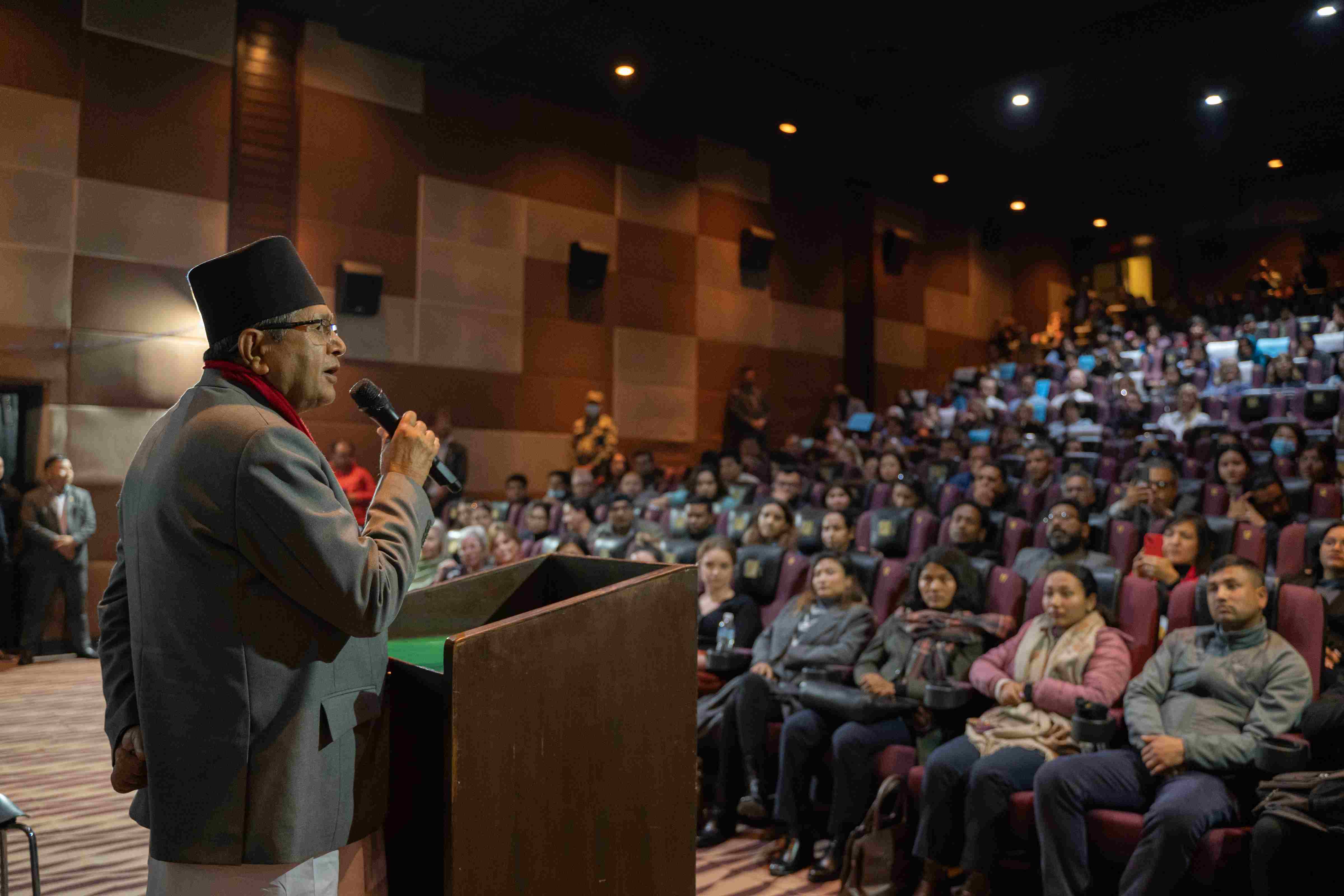
Speaker of the Federal House of Representatives, Devraj Ghimire, mentioned that when one denies one’s nature, the consequences can be disastrous. “If one rejects reality and makes future plans against one’s own natural tendencies, the consequences can be disastrous,” Speaker Ghimire elaborated during his remarks after the film’s closing, “It’s wrong to use force against nature.”
He further added that the constitution acknowledges the third gender even though mainstream society recognises only two genders. But what are the real struggles of gender and sexual minorities? And how should one act in order to address these struggles? What are the required rules and laws? We haven’t really been able to create a robust dialogue around these ideas,” Speaker Ghimire said. “One must understand these social issues in practical terms if one were to provide social guidelines.
“Blue Flower” nudges us towards that direction,” he added. The film, which tackles the issue of marriage, contains certain clues for a progressive, evolved society,” Speaker Ghimire continued, “These clues aid us in the process of constructing laws that benefit various aspects of public life. We have to accept that.”
Speaker Ghimire also added that he admired Pant’s work. “Although one-time lawmaker Sunil Babu Pant is currently involved in diverse projects, he managed to produce this film. And we ought to support this initiative.”
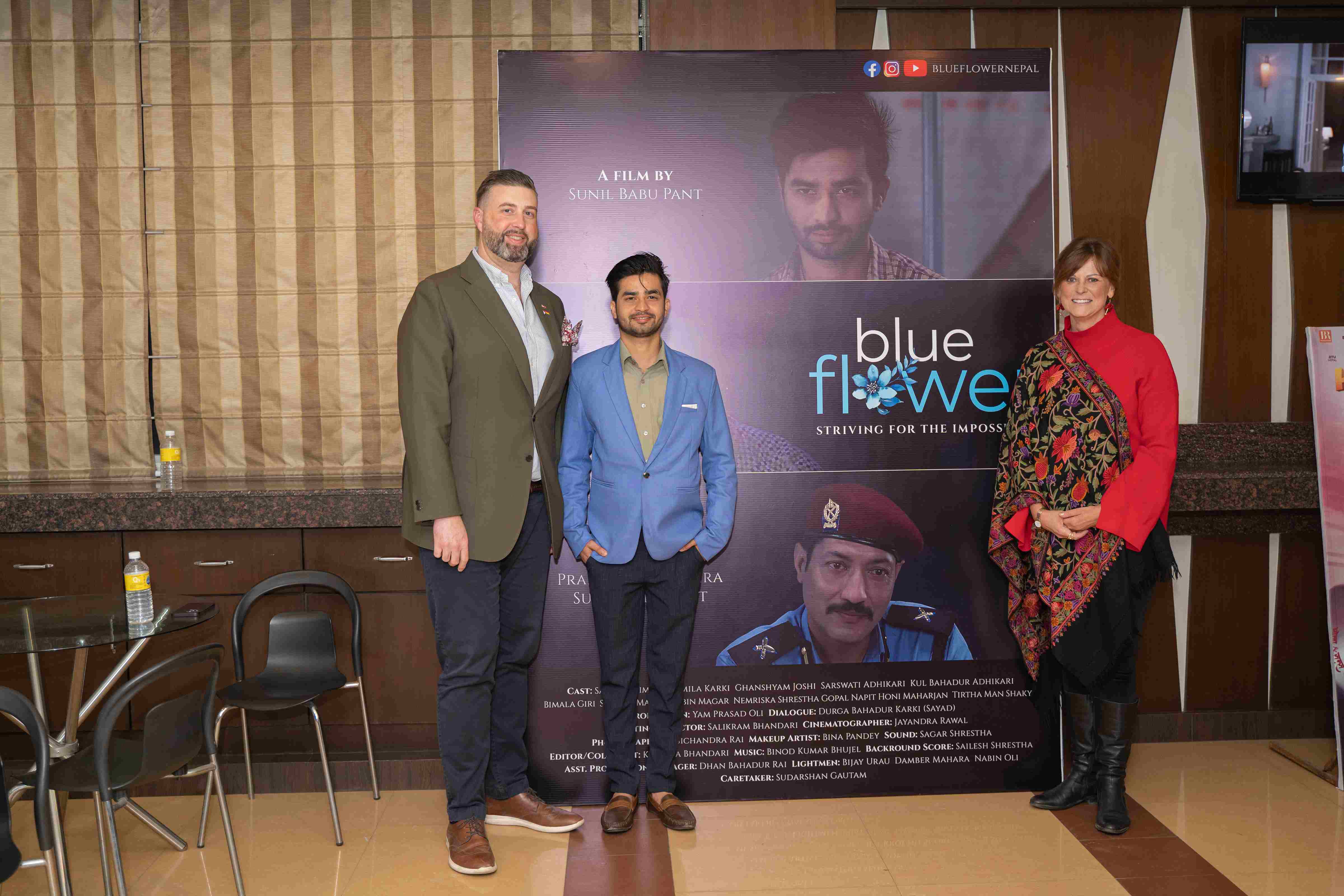
Supreme Court Justice Anil Kumar Sinha told the audience that the current court is very open when it comes to the human rights of sexual and gender minorities. He further reassured everyone that the court is determined to protect the human rights of everyone.
The premiere event of “Blue Flower”, which compels viewers to think rather than present easy solutions, was supported by the American Embassy. During the Kathmandu premiere of Blue Flower on February 8, the Australian Ambassador and the Deputy Chief of Mission of the US Embassy mentioned that the film subtly presents the real struggles of sexual and gender minorities from a sociocultural and economic lens.
This is a translation by Niranjan Kunwar of an article written by Madhav Dulal which was first published in Nepali on pahichan.com on February 9, 2023.
All photos are credited to Ustav Adhikari.
1678620516.jpg)

